Did you start noticing your dog is lazing around for days and having difficulty eating their meal or pooping?
If you start noticing these signs, better check their belly that may be unusually hard and painful. It is the classic case of stomach problems in dogs.
Dogs are born with a tough gut! They unapologetically eat anything they could find, including your socks and toys. However, it isn't uncommon for your furry friend to start having stomachaches afterward.
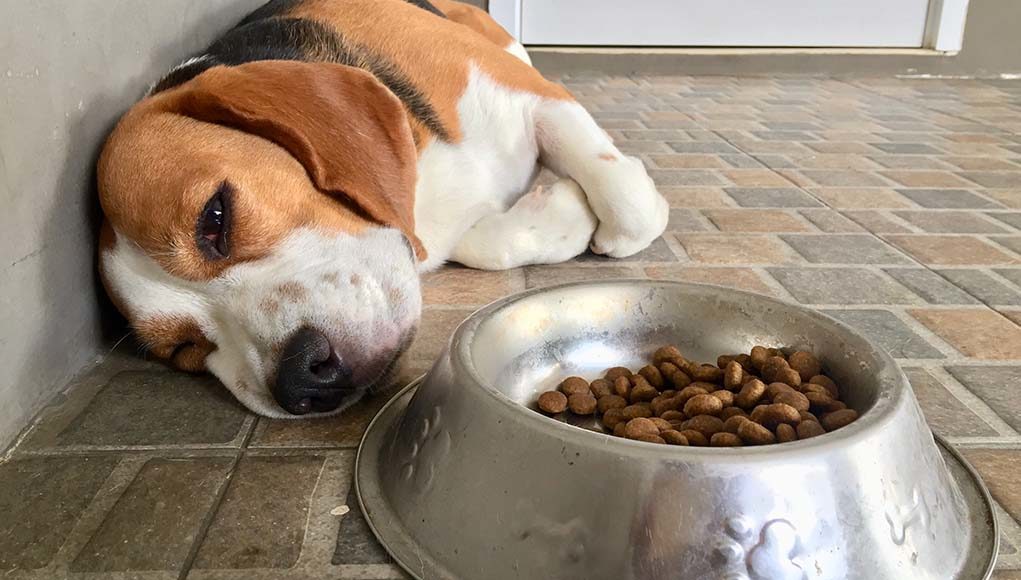
Symptoms of Stomach issues in dogs
You should know that whenever they start having a sensitive stomach, it has to do with what they ate before.
The lack of a balanced diet or wrong food is the primary culprit.
Is Sensitive Stomach Common in Dogs?
The sensitive stomach, also known as gastrointestinal upset, is the most common digestive issue faced by dogs.
The early signs of gastrointestinal upset include intermittent vomiting, loose stools, bloating, and passing excessive gas.
In many cases, dogs may develop digestive issues when their regular diet contains too much fat, a type of protein, or lacks sufficient fiber.
Unknown to most pet owners, commercial food can cause indigestions in few cases. Most canine food allergy cases involve a reaction to the protein source, such as chicken, beef, or egg.
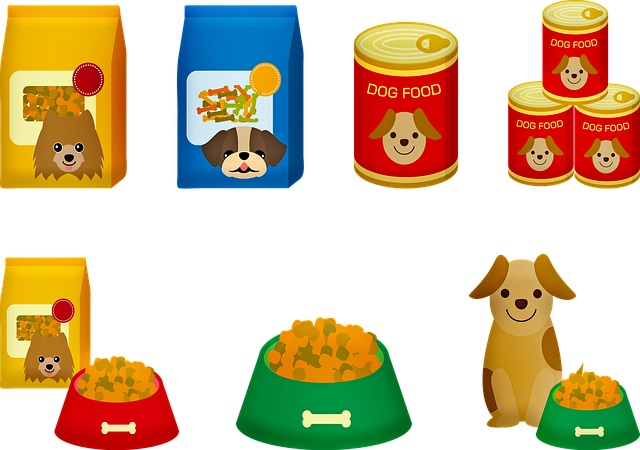
The stomach issues could be the alarming signs of severe disorders, including pancreatitis, bacterial overgrowth, or intestinal parasites in a few cases.
Do not lose hope yet! Most stomach issues are easily treatable.
Look out for these tell-tale signs of a sensitive stomach.
- Dehydration (dry/tacky/pale gums, low skin elasticity)
- Painful, distended, or hard belly
- Retching, trying to vomit, or difficulty defecating
- The appearance of blood in vomit, urine, or feces
- Lethargy
The signs of a sensitive stomach remain visibly present for days.
1. Vomiting
Many different factors may induce vomiting in dogs.
However, suppose it shows up with other symptoms such as bile vomiting, lethargy, and diarrhea. In that case, you should probe further to find out what is causing the vomiting.
- In most cases, yellow foam in the vomit indicates that the dog's stomach is relatively empty of food.
- Bilious vomiting syndrome may occur when your dog hasn't eaten in a while or if it has consumed an abnormally large amount of fatty foods.
You can fix this problem by administering a vet-recommended diet plan.
2. Diarrhea
Diarrhea is a common sign of a sensitive stomach, which may appear after other symptoms such as vomiting or stomach pain.
Loose stool can be a sign of a sensitive stomach, mainly if there was a recent change in diet.
Eating inappropriate food such as sugar delights, caffeine, milk, and chocolates may induce loose stool.
It's time to consult your vet if diarrhea persists. They would recommend you to change your diet or brand of food.
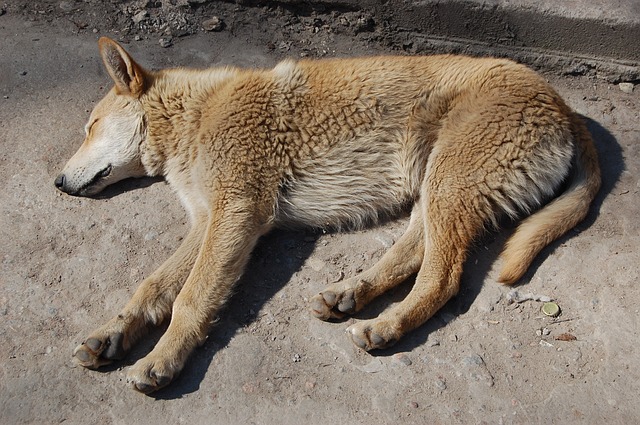
3. Gas
Dogs with bloating generally pass gas. Although it is harmless, you should recheck their daily diet and lifestyle to find anything uncommon.
Dogs may suffer from flatulence for many reasons.
- Gulping air when they eat
- Eating quickly
- Exercising after eating
- Eating or drinking too much
- Consuming milk-products
- Stress
In a rare case, it could be a gastrointestinal disease.
First and foremost, you should avoid feeding them particular food that may cause bloating in dogs, such as soybeans, peas, beans, milk products, high-fat diets, and spicy foods.
Taking a walk after a meal may also help to reduce bloating.
4. Eating grass
Dogs eating grass is unusual, but did you know consuming grass acts as a natural remedy for an upset stomach in dogs.
There are many reasons why your dog would start feeding on grass from the backyard. It helps to improve digestion, treat intestinal worms, or fulfill unmet nutritional needs.
Grass also serves as a good source of fiber; however, they shouldn't start feeding on it regularly.
You'd also notice your dog vomiting afterward; however, vomiting happens in less than 25% of dogs after grazing.
It may suggest that you should consult your vet and change your dog's diet plan quickly.
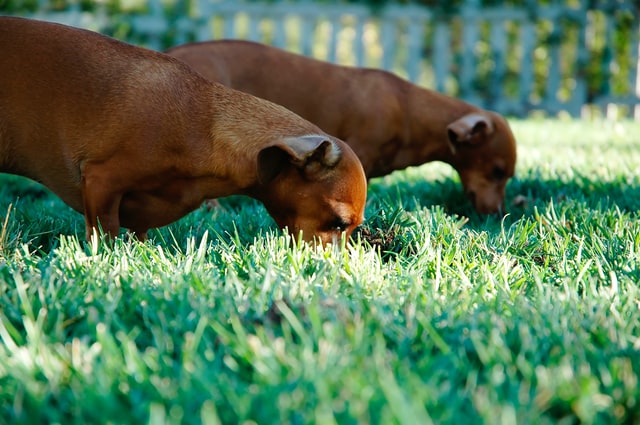
Is Your Dog's Food to Blame for Their Sensitive Stomach?
A stomach issue has everything to do with your dog's diet.
As mentioned before, common dietary culprits for indigestion in dogs include protein, insufficient fiber, and excess fat.
Many pet owners do not realize that they should stop feeding human food to their dogs. The kind of food they eat is inappropriate for the dog's digestion.
Serving table scraps and the leftover is a complete No-No.
Here is the list of food that you should altogether avoid feeding to your dog.
- Alcohol
- Avocado
- Chocolate and caffeine
- Citrus
- Coconut
- Grapes and raisins
- Macadamia Nuts
- Milk and dairy
- Onions and garlic
- Eggs and undercooked meat
- Cooked bones
- Salty food
- Xylitol (Found in Fruits)
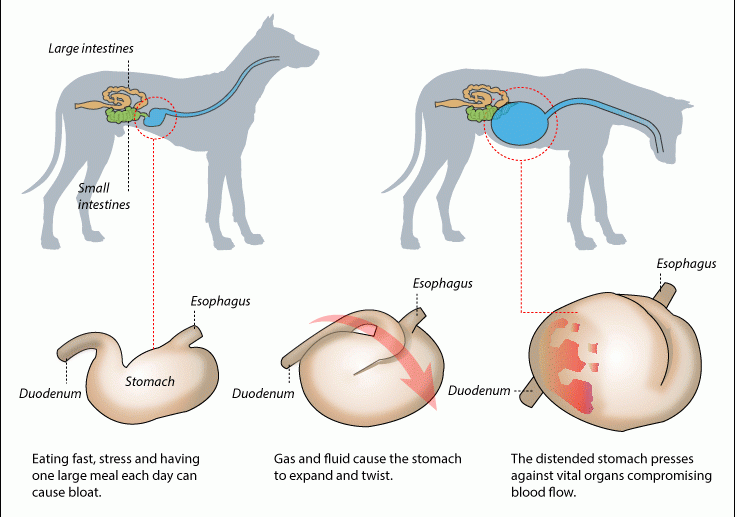
How to treat sensitive stomachs in dogs
Food allergy is common in many dogs, including puppies, older dogs, and certain breeds, prone to get sensitive stomachs after eating allergic foods such as chicken, beef, or egg.
Here is how you can treat sensitive stomachs in dogs.
1. Switch to a reliable brand of food
Check whether the ingredients in canned food are causing stomach issues because food intolerance is likely when you introduce a new food brand.
- Avoid feeding dehydrated food or over-processed canned food. It becomes harder to digest this food.
- Check whether the can food's label meets Association of American Feed Control Officials (AAFCO) nutrition standards. It ensures that the food was processed under expert supervision and tested for quality.
- Check whether the label indicates that the food is nutritionally complete or contains appropriate amounts of protein, carbohydrates, fiber, fat, vitamins, and minerals.
- Switch the meat item if your dog is allergic to either chicken or beef.
2. Try a Bland Diet as a Short-Term Fix
For dogs with severe stomach issues, consider switching to a bland diet for five to seven days before they can recover and start eating the usual meal.
A bland diet may include boiled and plain chicken and rice, turkey, sweet potato. Add a small amount of canned pumpkin to help resolve diarrhea.
A bland diet consists of items that are easy to digest, are soothing to their digestive system and contain ingredients that help restore solid stool.
Consider it a short-term fix for their immediate digestive issues.
3. Use Probiotics
Probiotics are a great source of food for dogs suffering from stomach issues. It is usually offered as a powder or liquid supplement that can be added to their food.
Check Purina Fortiflora Canine Nutritional Supplement Box for a probiotic supplement. Feed 1 tbsp per day for small dogs. 2 tbsp per day for medium-sized dogs, and 3 tbsp per day for large or giant-breed dogs.
Alternatively, you can add a tablespoon of plain, unsweetened yogurt to their food if they aren't allergic to it.
It will help soothe the stomach, replace healthy bacteria in the gut, improve digestive function, and even stimulate appetite.
4. Consider Switching to Food Made for Sensitive Stomachs
Talk to your vet to find the right kind of food for dogs with a sensitive stomachs.
They may recommend food that is rich in fiber and poor in excessive fat and protein.
Here are some recommendations.
Adding plenty of fiber ingredients, such as psyllium or beet pulp, to their food may also help firm up loose stools.
5. Try an Elimination Diet
An elimination diet is a prescription diet specifically formulated for pets with food allergies. A vet can only recommend the prescription diet.
- If the stomach issue persists after several diet changes, you should know that it could be a case of a food allergy.
- The elimination diet trial may last eight weeks to allow digestive inflammation and infections to resolve.
- All other foods and treats are discontinued during the trial period to avoid accidental exposure to an allergen, including regular food you give to your dog.
- After the trial is complete, your veterinarian may recommend switching back to the old diet to see if symptoms return or suggest an entirely new diet plan.
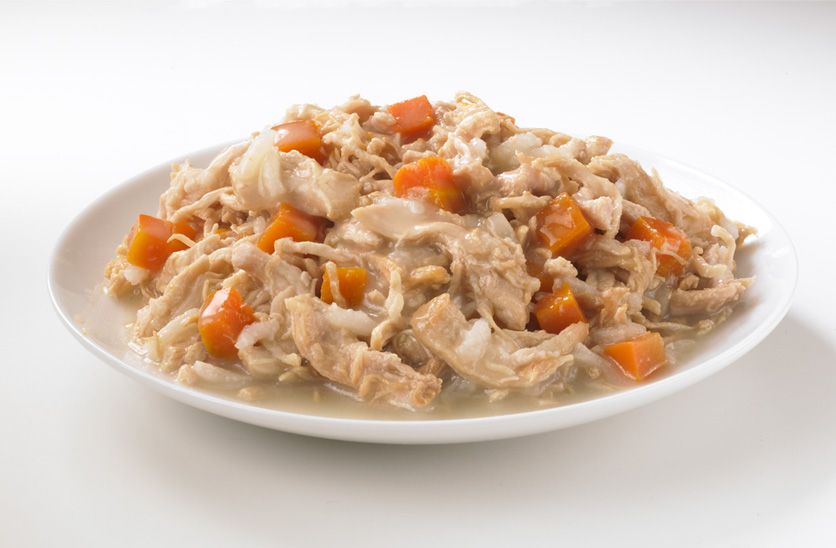
Conclusion
You can avoid a sensitive stomach by closely watching your dog's diet from Day One.
Avoid feeding home food that may make them feel bloated afterward. Consult the veterinarian to get the all-purpose meal recommendation for your dog.
If your dog has sensitive stomach issues, check for signs mentioned above and use the recommended solutions, Pronto.
Get in touch with Urban Pet Hospital & Resort, the Best Pet Daycare in Des Moines, to discuss sensitive stomach issues and professional advice.